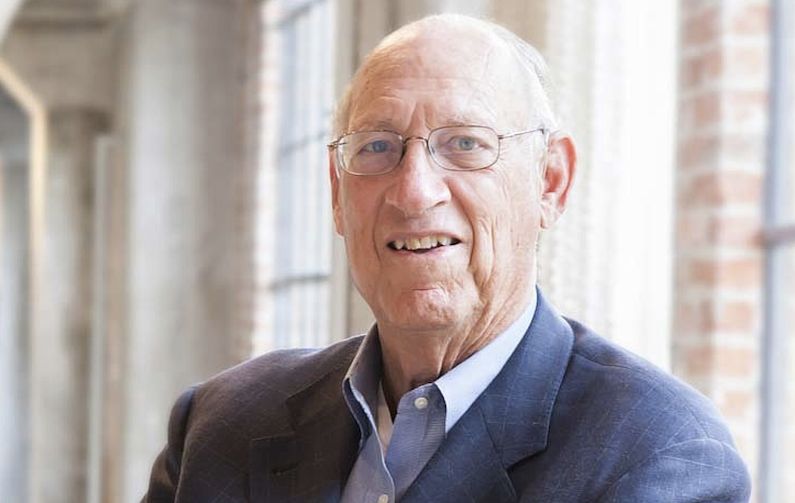Art Gensler, FAIA, FIIDA, RIBA, cofounder of Gensler, the world’s largest architecture firm, passed away Monday morning at his home in Mill Valley, Calif., at the age of 85.
The San Francisco Chronicle reported that Gensler had been battling lung disease over the last 18 months.
The firm was originally called M. Arthur Gensler Jr. and Associates, when Gensler, his wife Drucilla, and James Follett, a draftsperson, started the company in 1965. Gensler is widely credited with creating the blueprint for how professional service firms are organized and managed. He led Gensler until 2005, when the company’s Board of Directors introduced its current co-leadership management structure. He stepped down as chairman in 2010 though continued serving as an advisor to the firm for seven more years.
During his leadership tenure, Gensler saw the firm expand into a full-service practice whose interdisciplinary approach he helped craft. The firm that Art Gensler founded currently serves 28 practice areas from 50 offices around the globe. The company’s revenue hit $1.55 billion in 2020, continuing an upward trend that dated to 2010. Gensler is 100% owned by its 5,200 employees through direct shares and its ESOP plan.
In its 2020 annual report, Gensler stated that in 2019 alone its employees had worked on more than 7,000 projects representing over 1.5 billion sf of space. Its portfolio that year was designed to save over 16 million tons of CO2 emissions.
“Art’s lasting legacy is an ethos that only he could have created—a standard that allowed the firm to grow and prosper,” wrote Gensler’s co-CEOs Diane Hoskins, FAIA, NCARB, and Andy Cohen, FAIA, IIDA, in a remembrance they posted this evening. They added that Gensler championed an adaptive, proactive, and client-focused approach “that treated service as a privilege and clients as partners.”
ORIGINALLY FOCUSED ON OFFICE INTERIORS
Born in Brooklyn, N.Y., in 1935, Gensler earned a degree from Cornell University’s College of Architecture in 1958. Upon graduation, he worked for architecture firms in New York and Jamaica. He and his wife Drue migrated to California in the early 1960s, where Gensler worked for a few architectural firms, including Wurster, Bernardi, and Emmons. While at Wurster, he played a vanguard role establishing design standards for the Bay Area Rapid Transit system, then under construction.
When he opened his own shop, Gensler initially pioneered interiors for new office buildings. The firm started expanding domestically in the 1970s and 1980s, and then internationally in the ‘80s and ‘90s. (Among his accolades, Gensler was a professional member of the Royal Institute of British Architects.)
In 2015, he published Art’s Principles, which chronicled his 50 years in business and lessons learned. The book covers such topics as leadership, talent acquisitions and growth strategies.
Last January, Gensler made a $10 million gift to Cornell’s College of Architecture, Art, and Planning, whose program he helped create in 2006. As a result of that gift, the New York City location will be renamed the Gensler Family AAP NYC Center.
Gensler was predeceased by his wife, who died in 2017. He is survived by four sons and their families, 10 grandchildren and one great-granddaughter.
Related Stories
University Buildings | Jun 28, 2024
The American University in Cairo launches a 270,000-sf expansion of its campus in New Cairo, Egypt
In New Cairo, Egypt, The American University in Cairo (AUC) has broken ground on a roughly 270,000-sf expansion of its campus. The project encompasses two new buildings intended to enhance the physical campus and support AUC’s mission to provide top-tier education and research.
MFPRO+ New Projects | Jun 27, 2024
Chicago’s long-vacant Spire site will be home to a two-tower residential development
In downtown Chicago, the site of the planned Chicago Spire, at the confluence of Lake Michigan and the Chicago River, has sat vacant since construction ceased in the wake of the Great Recession. In the next few years, the site will be home to a new two-tower residential development, 400 Lake Shore.
Codes and Standards | Jun 27, 2024
Berkeley, Calif., voters will decide whether to tax large buildings with gas hookups
After a court struck down a first-in-the-nation ban on gas hookups in new buildings last year, voters in Berkeley, Calif., will have their say in November on a measure to tax large buildings that use natural gas.
Mass Timber | Jun 26, 2024
Oregon State University builds a first-of-its-kind mass timber research lab
In Corvallis, Oreg., the Jen-Hsun Huang and Lori Mills Huang Collaborative Innovation Complex at Oregon State University aims to achieve a distinction among the world’s experimental research labs: It will be the first all-mass-timber lab meeting rigorous vibration criteria (2000 micro-inches per second, or MIPS).
Sustainability | Jun 26, 2024
5 ways ESG can influence design and create opportunities
Gensler sustainability leaders Stacey Olson, Anthony Brower, and Audrey Handelman share five ways they're rethinking designing for ESG, using a science-based approach that can impact the ESG value chain.
Student Housing | Jun 25, 2024
P3 student housing project with 176 units slated for Purdue University Fort Wayne
A public/private partnership will fund a four-story, 213,000 sf apartment complex on Purdue University Fort Wayne’s (PFW’s) North Campus in Fort Wayne, Indiana. The P3 entity was formed exclusively for this property.
Sustainability | Jun 24, 2024
CBRE to use Climate X platform to help clients calculate climate-related risks
CBRE will use risk analysis platform Climate X to provide climate risk data to commercial renters and property owners. The agreement will help clients calculate climate-related risks and return on investments for retrofits or acquisitions that can boost resiliency.
MFPRO+ News | Jun 24, 2024
‘Yes in God’s Backyard’ movement could create more affordable housing
The so-called “Yes in God’s Backyard” (YIGBY) movement, where houses of worship convert their properties to housing, could help alleviate the serious housing crisis affecting many communities around the country.
Student Housing | Jun 20, 2024
How student housing developments are evolving to meet new expectations
The days of uninspired dorm rooms with little more than a bed and a communal bathroom down the hall are long gone. Students increasingly seek inclusive design, communities to enhance learning and living, and a focus on wellness that encompasses everything from meditation spaces to mental health resources.
Museums | Jun 20, 2024
Connecticut’s Bruce Museum more than doubles its size with a 42,000-sf, three-floor addition
In Greenwich, Conn., the Bruce Museum, a multidisciplinary institution highlighting art, science, and history, has undergone a campus revitalization and expansion that more than doubles the museum’s size. Designed by EskewDumezRipple and built by Turner Construction, the project includes a 42,000-sf, three-floor addition as well as a comprehensive renovation of the 32,500-sf museum, which was originally built as a private home in the mid-19th century and expanded in the early 1990s.

















